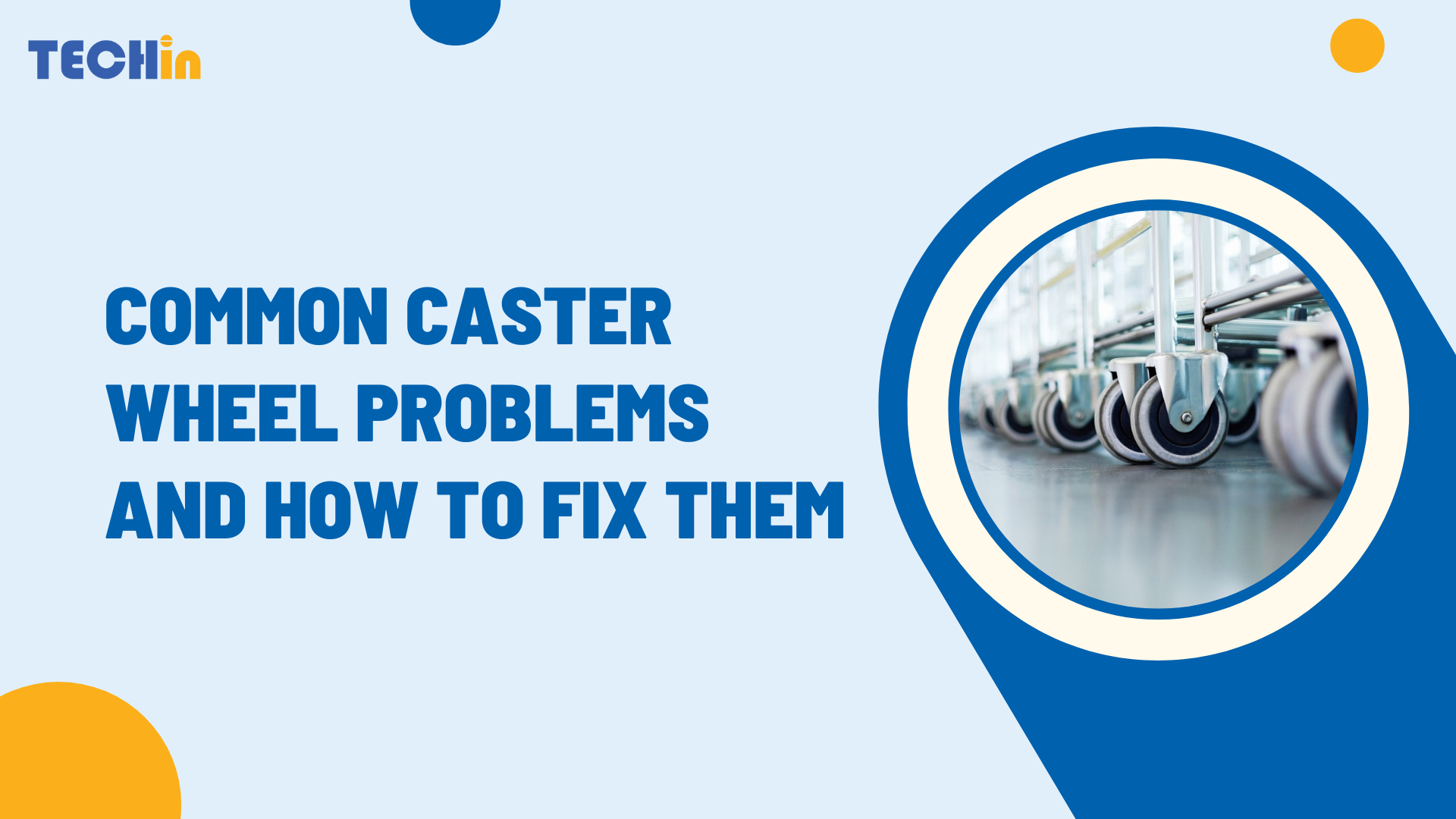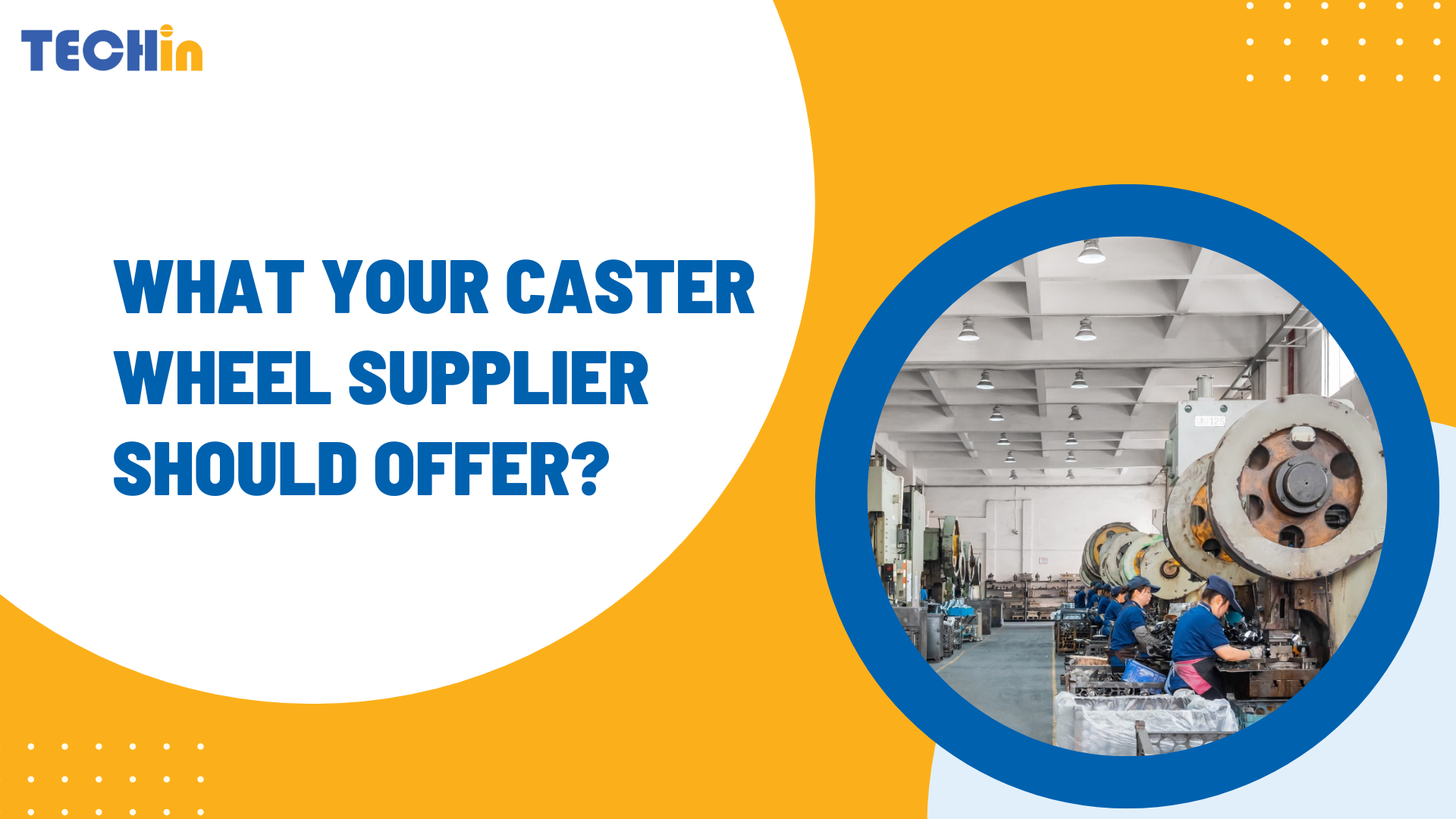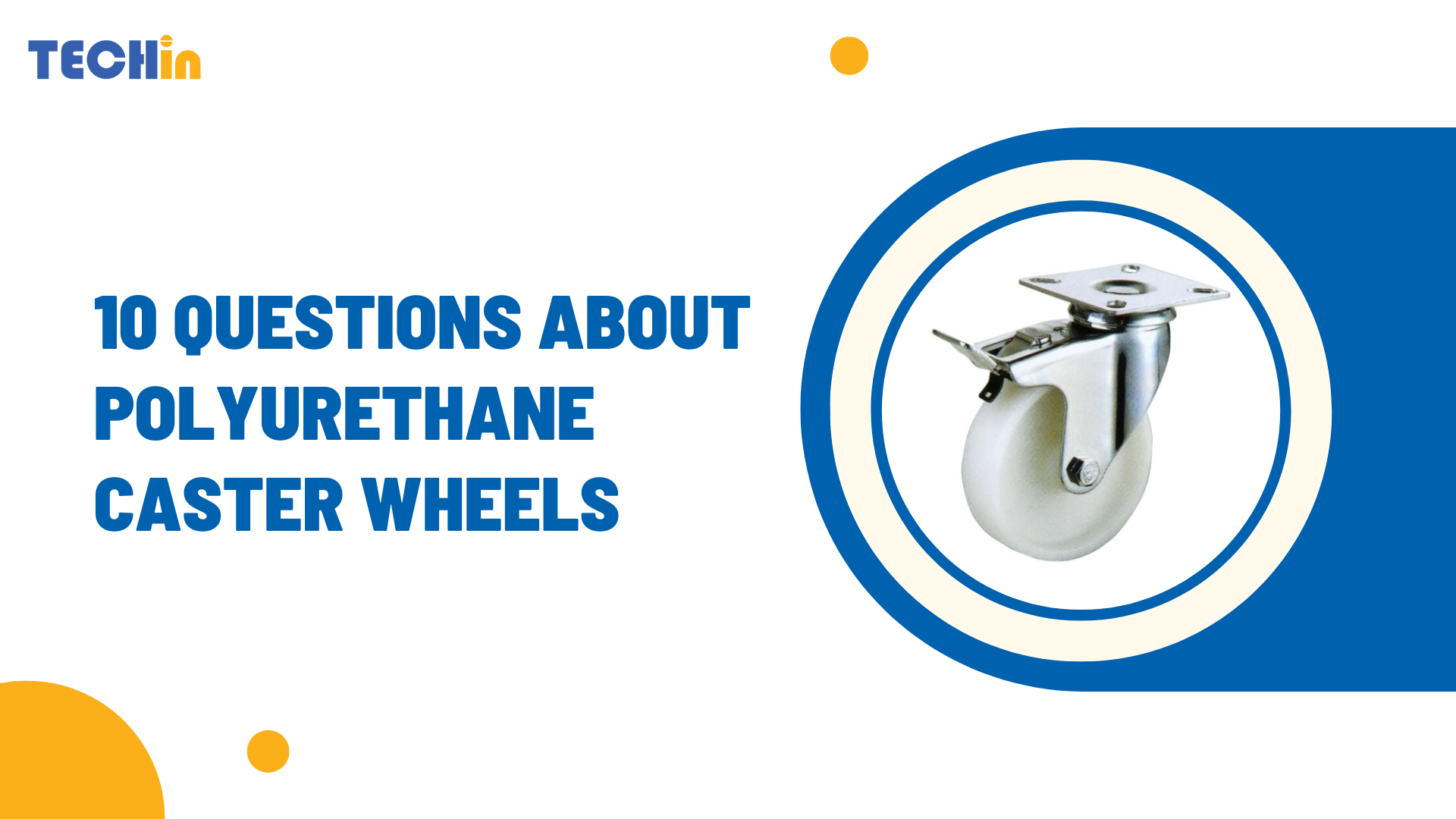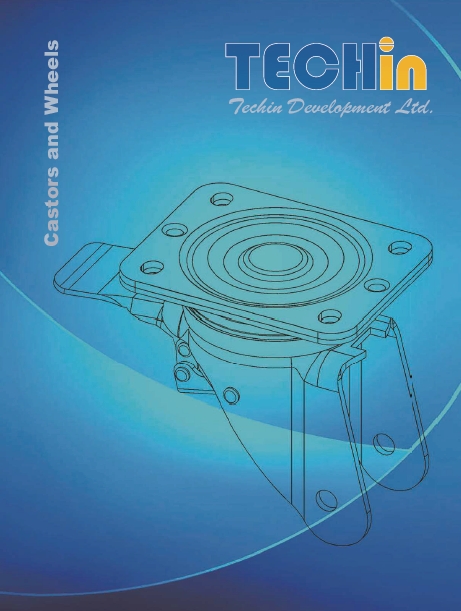When it comes to improving the mobility of your equipment and furniture, it’s important to choose the right swivel caster wheels. Whether you’re outfitting an industrial warehouse or a modern office, the right caster wheels can make all the difference in how easily things move and how efficient you are. But with so many types to choose from, it can be hard to know which ones are right for you.
Swivel caster wheels come in different types, including standard, heavy-duty, low-profile, and high-temperature casters, each designed for specific applications. They can be made from materials like rubber, polyurethane, nylon, and metal, offering different benefits such as smooth movement, durability, and chemical resistance.
Understanding the different types of swivel caster wheels and what they’re used for can help you make an informed decision. Let’s take a closer look at the different types, materials, and uses of these essential components.
What Are Swivel Casters?
Swivel casters are a critical component in many industries, providing mobility and ease of movement for all types of equipment and furniture. Unlike rigid casters that only move in a straight line, swivel casters can rotate 360 degrees, allowing for greater maneuverability. This flexibility makes them ideal for applications where precise movement is essential, such as in tight spaces or when navigating obstacles.
Types of Swivel Caster Wheels
There are several types of swivel caster wheels designed for different applications. Understanding these types can help you choose the best one for your needs.
- Standard Swivel Casters: These are general purpose casters that you can use in many different places. You see them on office chairs, carts and light equipment. You get smooth movement from them and they’re usually made out of materials like rubber and polyurethane.
- Heavy Duty Swivel Casters: If you’re carrying heavy stuff, these casters are built with stronger materials and more robust construction. They can support loads ranging from 2,000 to 5,000 pounds. You see them a lot in industrial settings like warehouses and manufacturing plants.
- Low Profile Swivel Casters: If you need to get something down low, these casters are used where height is important; we’re talking low-clearance equipment. These casters give you stability and they’re great for those heavy applications where space is limited.
- High Temperature Swivel Casters: Where you have extreme heat — like ovens or autoclaves — these casters are made out of materials that can take it. You see these a lot in food service and medical settings. You see them in industry, too, in applications where you have equipment that’s exposed to high temperatures.
Table 1: Types of Swivel Caster Wheels
| Type | Description | Common Applications |
|---|---|---|
| Standard Swivel Casters | General-purpose, smooth movement | Office chairs, carts, light equipment |
| Heavy Duty Swivel Casters | Designed for heavy loads, robust construction | Warehouses, manufacturing plants |
| Low Profile Swivel Casters | Stability in low-clearance spaces | Heavy-duty equipment with limited space |
| High Temperature Swivel Casters | Withstands high temperatures | Food service, medical, industrial ovens/autoclaves |
Materials Used in Swivel Caster Wheels
Swivel caster wheels can be made from different materials, each with its own benefits. Choosing the right material is important to ensure the longevity and performance of your caster wheels.
- Rubber: Gives you a smooth ride and good shock absorption. Rubber casters work great on uneven surfaces and they don’t damage floors. That’s why they’re best sellers in healthcare and office settings.
- Polyurethane: We use polyurethane on casters because it’s durable and resists chemicals. These casters can take heavy loads and give you good traction. You see them a lot in warehouses and manufacturing plants.
- Nylon: Nylon wheels are lightweight and work for light to medium loads. Nylon resists water, oils, and chemicals, so you see a lot of these casters in environments where you have that exposure.
- Metal: Extremely durable and can carry heavy loads, often used in industrial applications. Metal casters, such as those made from steel or cast iron, are designed for heavy-duty use and can withstand harsh conditions.
Table 2: Materials Used in Swivel Caster Wheels
| Material | Benefits | Common Applications |
|---|---|---|
| Rubber | Smooth ride, good shock absorption | Medical, office settings |
| Polyurethane | Durable, chemical resistant, good traction | Warehouses, manufacturing facilities |
| Nylon | Lightweight, water/oil/chemical resistant | Environments with exposure to substances |
| Metal | Extremely durable, heavy load capacity | Industrial applications |
Swivel Caster Wheels for Different Applications
Different environments require different types of swivel casters. Understanding the specific needs of your application can help you choose the right caster wheels.
- Industrial: Heavy-duty casters for manufacturing and warehousing. Industrial swivel casters are built to handle the rigors of heavy usage and are often made from durable materials like polyurethane or metal.
- Medical: Casters designed for hospital beds, equipment, and carts. Medical swivel casters are designed to provide smooth and quiet movement, with non-marking materials to ensure a clean environment.
- Office: Smooth-rolling casters for office chairs and furniture. Office swivel casters are typically made from rubber or polyurethane to protect floors and provide a comfortable ride.
- Retail: Casters for shopping carts and display units. Retail swivel casters need to be durable and provide smooth movement to enhance the shopping experience.
Heavy Duty Swivel Caster Wheels
Heavy-duty swivel casters are designed to handle loads typically ranging from 2,000 to 5,000 pounds. They are often used in industrial settings, such as warehouses and manufacturing plants. These casters are made from high-strength materials like forged steel and can withstand harsh conditions. Heavy-duty casters often feature reinforced frames and larger wheels to provide stability and ease of movement under heavy loads.
Swivel Caster Wheels with Brakes
Swivel caster wheels with brakes provide added safety by allowing the user to lock the wheels in place. This is particularly useful in medical and industrial settings where stability is crucial. Brakes can be engaged to prevent movement, ensuring that equipment stays securely in place. There are different types of braking mechanisms, including foot-operated and hand-operated brakes, allowing users to choose the best option for their needs.
Table 3: Swivel Caster Wheels for Different Applications
| Application | Key Features | Examples |
|---|---|---|
| Industrial | Heavy-duty, durable materials, reinforced frames | Warehouses, manufacturing plants |
| Medical | Smooth movement, non-marking materials | Hospital beds, medical equipment |
| Office | Floor protection, comfortable ride | Office chairs, desks |
| Retail | Durable, smooth movement | Shopping carts, display units |
Furniture Swivel Caster Wheels
Furniture casters are made so you can move furniture with ease and not scratch up your floors. A lot of times, they’re made out of rubber or a softer polyurethane so you don’t scratch anything up. You see these casters a lot on chairs in offices and desks. Basically, if you move furniture around, you have these casters on your furniture. You can get them in different sizes and different styles so the furniture looks nice, but they all move nice and quiet.
Industrial Swivel Caster Wheels
Industrial casters are built for heavy use in places like factories and warehouses. They often have reinforced frames and wheels made out of materials like polyurethane or metal. Industrial casters are made to take heavy loads, harsh conditions, and a lot of use. You can get them in different sizes and different load capacities for different industrial applications.
Medical Swivel Caster Wheels
Medical casters are made for hospital equipment. They have low rolling resistance, they move smooth, and they don’t mark up anything. You see these casters on hospital beds, carts, and other medical equipment that you have to move around a lot and move smooth. They’re made to be stable and safe in a healthcare environment.
How Do Swivel Caster Wheels Work?
Swivel casters work because the wheel can rotate around a vertical axis. That’s why you can go 360 degrees. They do this with a swivel bearing. It can be a ball bearing or a kingpin design. The swivel bearing lets the wheel pivot so you can move it around. That’s why you can go any direction you want. That’s why you use swivel casters when you need to move stuff around.
Table 4: Key Features of Swivel Caster Wheels
| Feature | Description | Benefit |
|---|---|---|
| 360-Degree Rotation | Allows wheel to rotate around a vertical axis | Increased maneuverability |
| Swivel Bearing | Can be a ball bearing or kingpin design | Smooth and flexible movement |
| Various Materials | Rubber, polyurethane, nylon, metal | Adaptable to different environments |
| Load Capacities | Ranges from light to heavy-duty loads | Suitable for diverse applications |
Benefits of Using Swivel Caster Wheels
Swivel caster wheels offer several benefits, including:
- Increased maneuverability: Easy to navigate tight spaces.
- Versatility: Suitable for various applications, from light-duty office furniture to heavy-duty industrial equipment.
- Improved safety: Options like brakes and locking mechanisms enhance stability and control.
Swivel casters are essential for applications where equipment needs to be moved frequently and precisely. They provide flexibility and ease of movement, making tasks more efficient and reducing the risk of injury.
How to Maintain Swivel Caster Wheels
Regular maintenance of swivel caster wheels ensures longevity and performance. This includes:
- Lubrication: Keeping the swivel bearing well-lubricated to ensure smooth movement. Use appropriate lubricants based on the manufacturer’s recommendations. Regular lubrication can prevent rust and reduce friction, extending the life of the caster wheels.
- Inspection: Regularly checking for wear and tear, such as cracks or deformities in the wheels. Inspect the wheels, bearings, and axles for any signs of damage. Replace any components that show significant wear to avoid failure during operation.
- Cleaning: Removing debris and dirt that can affect movement and cause damage to the wheels or bearings. Clean the casters with a mild detergent and water. Avoid using harsh chemicals that can degrade the wheel material. Make sure to dry the casters thoroughly to prevent rusting.
- Tightening Hardware: Ensure all nuts, bolts, and fasteners are securely tightened. Loose hardware can lead to wobbly movement and increased wear on the casters.
- Rotation: For applications with multiple casters, periodically rotate the casters to ensure even wear. This is particularly important for equipment that carries uneven loads.
Proper maintenance can extend the life of your caster wheels and prevent common problems that can lead to costly repairs or replacements.
Common Problems with Swivel Caster Wheels and How to Fix Them
Some common problems with swivel caster wheels include:
Wheel Lock-up:
- Cause: Often due to debris or dirt getting lodged in the wheel or swivel bearing.
- Solution: Clean the wheel and bearing thoroughly. Regular maintenance and cleaning can prevent this issue from recurring.
Noisy Operation:
- Cause: Lack of lubrication in the swivel bearing or wheel axle.
- Solution: Apply appropriate lubrication to the bearing and axle. Regular lubrication will keep the casters operating quietly and smoothly.
Uneven Wear:
- Cause: Overloading one side of the caster, improper installation, or frequent use on uneven surfaces.
- Solution: Ensure the load is evenly distributed. Rotate the casters periodically to ensure even wear. Inspect the installation to make sure it is correct and secure.
Loose Swivel:
- Cause: The swivel section can become loose over time due to constant use.
- Solution: Tighten the swivel assembly as needed. In some cases, the entire caster may need to be replaced if the wear is too extensive.
Flat Spots on Wheels:
- Cause: Stationary loads over long periods can cause flat spots on soft wheels like rubber or polyurethane.
- Solution: Move the equipment periodically to prevent flat spots. Consider using harder materials if the equipment will remain stationary for long periods.
Corrosion:
- Cause: Exposure to harsh environments or chemicals can lead to corrosion, particularly on metal components.
- Solution: Choose casters with corrosion-resistant materials like stainless steel or zinc-plated metals. Regularly clean and inspect the casters to remove any corrosive substances.
How to Choose the Right Swivel Caster Wheels
Choosing the right swivel caster wheels depends on several factors. By considering these aspects, you can ensure that the casters you select will meet your needs and perform effectively in your specific application.
1. Load Capacity:
- Ensure the casters can handle the weight of your equipment. Overloading casters can lead to failure and damage to both the casters and the equipment.
2. Environment:
- Consider the conditions in which the casters will be used. For example, high-temperature environments, exposure to chemicals, or outdoor use may require specialized materials and designs.
3. Floor Surface:
- Different casters are suited to different floor surfaces. Hard wheels work well on smooth, hard surfaces, while softer wheels are better for uneven or delicate floors.
4. Frequency of Use:
- Heavy-duty casters are necessary for equipment that will be moved frequently. For less frequent use, standard casters may suffice.
5. Special Features:
- Consider additional features such as brakes, locking mechanisms, and swivel locks to enhance safety and functionality.
6. Material:
- Select the appropriate material based on the application. For instance, rubber or polyurethane for floor protection, metal for heavy-duty loads, and nylon for chemical resistance.
Table 5: Factors to Consider When Choosing Swivel Caster Wheels
| Factor | Considerations | Recommendations |
|---|---|---|
| Load Capacity | Weight of equipment | Match caster load capacity to equipment |
| Environment | Temperature, chemical exposure, outdoor/indoor | Select materials suitable for environment |
| Floor Surface | Smooth, rough, delicate, uneven | Choose appropriate wheel hardness |
| Frequency of Use | How often the casters will be moved | Opt for heavy-duty or standard casters |
| Special Features | Brakes, locking mechanisms, swivel locks | Add features for safety and functionality |
| Material | Rubber, polyurethane, metal, nylon | Match material to application requirements |
Summary
Swivel caster wheels are a versatile and essential component for various industries and applications. By understanding the different types, materials, and applications, buyers can make informed decisions to ensure they select the best caster wheels for their needs. Regular maintenance and choosing the right caster wheels for your specific application can enhance performance, safety, and longevity.
Swivel casters provide increased maneuverability, versatility, and improved safety, making them ideal for environments ranging from industrial warehouses to medical facilities and office spaces. With the right choice of materials and proper maintenance, swivel caster wheels can offer reliable and efficient service for years to come.
By addressing common problems and ensuring proper selection and maintenance, you can maximize the benefits of swivel caster wheels and ensure smooth, reliable operation in any application.







